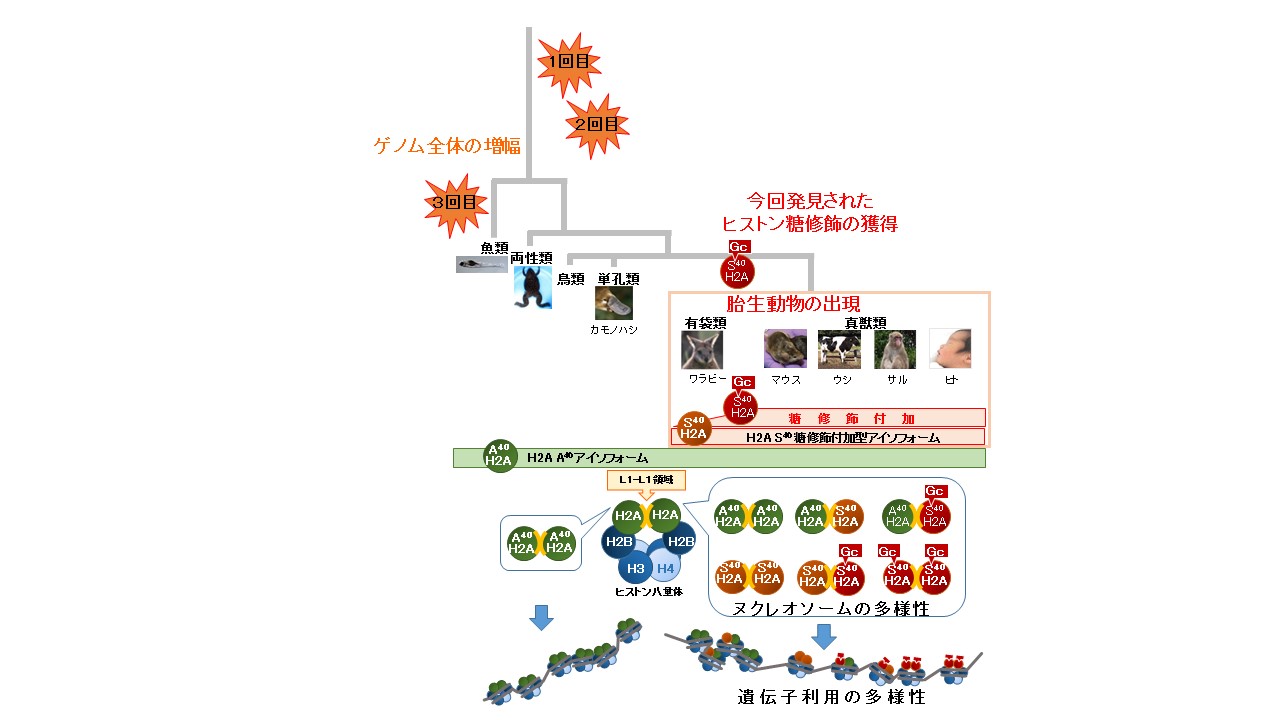Discovery of new epigenetic mechanism linked to evolution of placental animals
Tue, Sep 20, 2016-
Tags
Senior Researcher Kunio Shirota and Junior Researcher Daisuke Arai from Waseda Research Institute for Science and Engineering collaborated with researchers from the Laboratory of Cellular Biochemistry at the University of Tokyo and the Biomolecular Characterization Unit at RIKEN Center for Sustainable Resource Science, and they discovered a new epigenetic* mechanism which is linked to the evolution of placental animals, including most mammals with a placenta such as humans and cows. Their research was published in Scientific Reports, an online magazine by Nature Publishing Group, on September 12.
*Epigenetics is the study of chemical reactions which strategically effect parts of the genome without changing the DNA sequence.
The genome DNA is wound around protein cores known as histones to form nucleosome structures. Nucleosomes that are assembled, folded, and condensed are called chromatins, and when these chromatins are further folded, they become chromosomes. The new research team discovered a new histone modification by N-acetylglucosamine, a derivative of glucose. This glucose modification is generally known to have nutritional responsiveness and to exist in areas significantly influential to the nucleosome structures. Many histone isoforms, functionally similar proteins to histones but not identical in amino acid sequence, exist in histones. Yet, isoforms have been assumed to encode functionally equivalent histone proteins because of the isoform’s high homogeneity. However, the newly discovered histone modification is only supplemented by histone isoforms, which are exclusive to placental animals, proving that isoforms have a distinct function on. When placental animals came into existence, histone modification became possible due to a small biochemical change in one amino acid. Such epigenetic evolution has enhanced the development of placental animals, leading to the diversity of nucleosomes and how genes are used.
The monoclonal antibodies which specifically recognize such glucose modification will become a powerful tool in understanding biological functions, especially of mammals. In the future, the monoclonal antibodies are expected to contribute to developing treatment for diseases specific to mammals from a nutritional perspective. Moreover, the discovery of histone modification specific to placental animals is extremely rich in novelty. Because this glucose modification is closely related to glucose metabolism, there is a possibility of developing treatment for metabolism-related diseases in mammals with the novel histone modification as an index from a nutritional approach.
For more in-depth understanding, read the full paper available below:
Publication
Magazine: Scientific Reports published by Nature Publishing Group
Paper title: Novel O-GlcNAcylation on Ser40 of canonical H2A isoforms specific to viviparity (click on the title to read the full paper)
Authors: Mitsuko Hirosawa* (Laboratory of Cellular Biochemistry), Koji Hayakawa* (Laboratory of Cellular Biochemistry), Chikako Yoneda (Laboratory of Cellular Biochemistry), Daisuke Arai (Waseda Research Institute for Science and Engineering), Hitoshi Shiota (Laboratory of Cellular Biochemistry), Takehiro Suzuki (Biomolecular Characterization Unit), Satoshi Tanaka (Laboratory of Cellular Biochemistry), Naoshi Dohmae (Biomolecular Characterization Unit) and Kunio Shiota* (Laboratory of Cellular Biochemistry and Waseda Research Institute for Science and Engineering)
*These authors contributed equally to this work.












